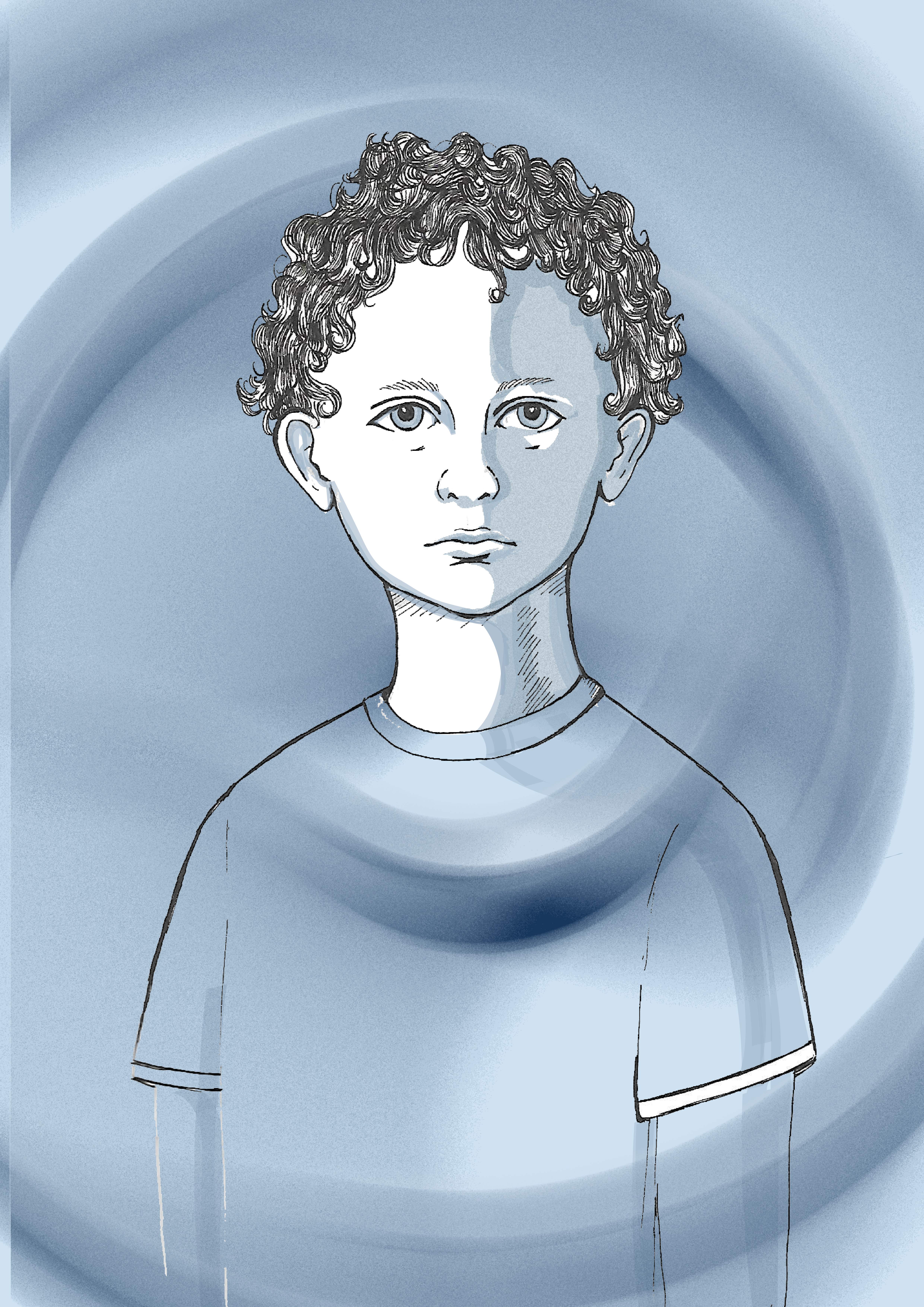[Written by James Taylor (he/him)]
[Art by Ella Ottersbach-Edwards (she/her)]
CW: Brief mentions of mental health
In my late teens, my mother told me the story of a close relative of ours who had gone to see a professional spiritualist when I was about 6 or 7. I was by no means the main topic of conversation, but the spiritualist apparently informed them that I was something called an Indigo Child. I must admit, when my mum relayed this years later, my first thought was of Violet Beauregard’s post-blueberry transformation in Charlie and the Chocolate Factory. I assumed this wasn’t what the spiritualist meant: ‘I think it means you’re creative,’ Mum said, ‘I’m not entirely sure.’ I decided to do some research to quench my curiosity and dispel the niggling fear of spontaneously metamorphosing – Roald Dahl style.
Mum had been right, thankfully. Indigo children are part of a New Age pseudoscience movement, a term attributed to kids with seemingly unusual or spiritual qualities. When I briefly investigated it a few years ago, I was quietly pleased, as if this explained the shy, frustrated and painfully sensitive nature I developed growing up. However, taking the opportunity to do more concrete research for writing this, I’m much more sceptical.
This might be explained with a better definition of the ‘unusual or spiritual qualities’ that are prescribed to indigo children. The movement was generated by New Age synesthete Nancy Ann Tappe. In her 1986 work, Understanding Your Life Through Color, she revealed that everyone was born with a coloured ‘aura’ that remained with them throughout their life and which explained their spiritual character. Beginning in the 1950’s, but rapidly increasing after the 70’s, more children with an ‘indigo’ aura were registered by pseudoscientists. Children with this energy were argued to have supernatural or spiritual capabilities, varying from stronger empathy to an ability to converse with spirits.
Diagnosis was often given by parents and spiritualists attempting to explain a child’s difficulty with social or institutional traditions – a consequence of the indigo child’s incompatibility to them – and I was struck by the sheer amount that apparently constitutes ‘indigo’. Nothing has been scientifically proven to whether indigo children really exist. Signs a child may be ‘indigo’ include strong intuition, creativity, also a headstrong, passionate, and questioning character. They might also be a bit psychic. In one account I read, a child diagnosed as ‘indigo’ described themselves as ‘an emperor from another planet’ who had fallen into his mother’s womb by accident; another girl casually spoke to gnomes.
And here’s where my scepticism began to germinate. Truthfully, some of the indigo attributes, my childhood self would have identified with – a feeling of otherness, creative interests, difficulty socialising. However, does this not describe a vast number of children, many of whom will grow up to be neurotic Arts students like me? It’s a very broad boundary line for what is presented as an anomaly. But I certainly never (to the best of my knowledge) displayed psychic tendencies, or an aptitude for gnome-whispering. ‘Indigo’ seems to be a way of codifying or explaining difference, a difference which is usually an entirely normal feeling growing up, in my opinion. Sarah Whedon twins the rise in ‘indigo’ to the rise in ADD or ADHD cases, and argues that many parents were using ‘indigo’ as an alternative diagnosis. What in one prescriptive term is perhaps viewed as a problematic issue for a child’s development, a spiritual re-diagnosis presents these qualities as evidence of enlightenment that a child needs to be nourished and guided rather than ‘cured’.
I appreciate the goodwill of the ‘indigo’ argument but suggesting a childhood issue is spiritual frustration does not neutralise it. I have never experienced any attention deficit disorders, but perhaps in terms of my shyness or sensitivity, I would rather have been encouraged and guided in childhood social situations than be told I was spiritually awakened. I never knew I was apparently ‘indigo’ until well out of childhood, but I’m glad my equally sceptical Mum didn’t tell me about it at the time. I can well imagine trying to fling classroom enemies out the window with the power of my mind if I’d been told I was possibly psychic, and that wouldn’t have helped my social struggles whatsoever.
This leads me to conclude I’m probably not ‘indigo’, simply because I don’t think it exists. The spiritualist has never even met me – was it something viable long distance, an aura sensed through others? It’s not that I’m spiritually closed minded, but I feel that trying to explain the difference in children generates compound feelings of otherness. There have always been shy, frustrated, strange children, myself formerly one of them, but a spiritual diagnosis would not have cured my fear at being different, it would have rather cemented it. Still, I truly wish I’d been able to play the ‘How-dare-you-I’m-probably-a-former-intergalactic-emperor’ card when I had forgotten my homework.

